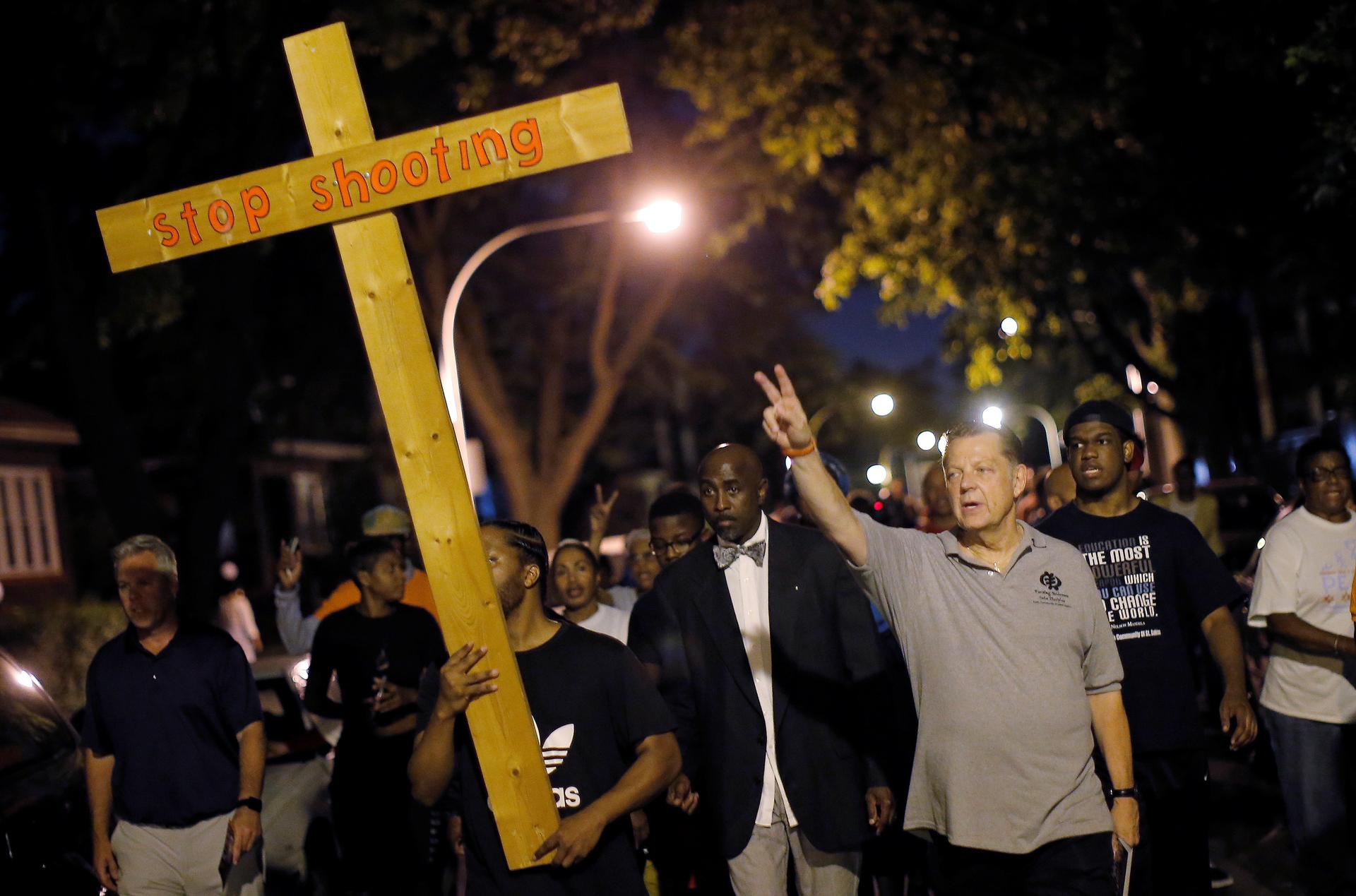Families in Chicago are tired of gun violence. Will 2017 be different for them?
Father Michael Pfleger marches through the streets of a South Side neighborhood during a weekly night-time peace demonstration in Chicago, Illinois, September 16, 2016.
Will 2017 be different for Chicago?
Last year, violence there reached levels not seen since the late 1990s, with 3,550 shooting incidents and 762 murders. And the city's kids were often the unintended victims of a spiking crime rate.
Though the shootings in 2016 placed the Windy City under a microscope, many there have been struggling with the pain of gun violence for decades, including Seonia Owens. She lost her 15-year-old son, Robert “Mushy” Owens, when he was fatally shot in 1998.
“The day Mushy got killed, my mind just went completely blank,” Owens says.
According to authorities, Robert Owens was killed by a 12-year-old boy during a gang initiation. Robert's friend, 14-year-old Delvon Harris, also died during the incident. Seonia Owens says she was crippled when she found out that her young son had been killed.
“I got bars on my doors — I couldn’t get the key to work to save my life,” she says. “I took off running, but for some reason my legs were just like lead. And by the time I got there, I was saying in my head, ‘This can’t happen to me again.’ Because I have been the mother of seven kids, and I’ve lost four — two died in a fire and one died at birth.”
Robert’s older sister, Sharon Burgman-Owens, still feels the blistering sting of loss that came with her brother’s death.
“I took out my anger with what happened to Mushy on all teenagers,” says Burgman-Owens. “My son had a friend who was about the size of the kid that killed my brother — I hated this kid.”
The family has since relocated to Kenosha, Wisconsin.
“I left Chicago because I didn’t want to be there any more,” says Owens. “It wasn’t safe for my family — people was getting killed. I had seen seven of my friends’ sons get killed and stuff, and [I wondered if] I was next. No, I didn’t want to be there anymore.”
When gun violence kills one person, it ripples through an entire family, she adds.
“When you take that one bullet, you have destroyed a whole family,” she says. “You might as well say you shot everybody.”
Though Robert Owens was killed nearly 20 years ago, his story is all too familiar for many families in Chicago. In 2016, children under the age of 13 were wounded or killed in 41 shootings, a figure that doubled from the previous year. To date, only three arrests have been made in those shootings.
“Forty-one shootings is just so much higher than any time in the last 10 years,” says Patrick Smith, a reporter for Chicago's WBEZ. “It’s basically 2013, 2014 and 2015 combined.”
As gun violence claims more and more young victims in Chicago, residents are readjusting. According to Smith, unintended gun deaths are being normalized among some residents.
“I heard it again and again from people in every neighborhood in the city, and also from criminologists, and I heard it from police,” Smith says. “I talked to Superintendent Eddie Johnson, who leads our police department here, and he said he not only is seeing that callousness from gang members, but he thinks that people in the community are also not as shocked when an innocent victis is killed or wounded.”
“There’s no outrage when you see a young kid killed by a gang member, and I don’t understand that,” says Johnson.
Some in the Chicago Police Department, including Johnson, believe community members are reluctant to come forward to report gang-related crime because there is a fundamental distrust of law enforcement in the Windy City’s poorest communities.
“That is certainly what you hear from police, but I don’t know if that’s true,” says Smith.
Arthur Morris, the grandfather of Tacarra Morgan, a 6-year-old girl who was hit by a stray bullet in July, says that justice should be sought even if community members are afraid to talk to the police. He argues that law enforcement will aggressively search for suspects if one of their own is killed or injured, but not if a community member is.
While the debate over justice and policing marches forward, Smith says Chicago is left in a vulnerable position.
“The impact [of gun violence] isn’t just on the family, it’s on the whole community,” Smith says. “When you have something like this where an innocent kid can be shot and there are no repercussions for the people who do the shooting, it sends shock waves — it kind of means no one is safe, or at least that’s what I’m hearing from people.”
This story was first published as an interview on PRI's The Takeaway, a public radio program that invites you to be part of the American conversation.
Every day, reporters and producers at The World are hard at work bringing you human-centered news from across the globe. But we can’t do it without you. We need your support to ensure we can continue this work for another year.
Make a gift today, and you’ll help us unlock a matching gift of $67,000!
